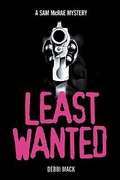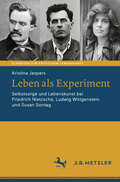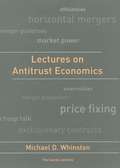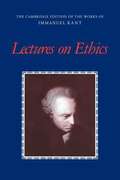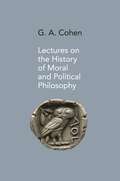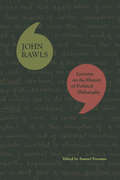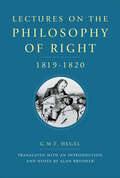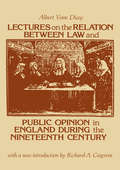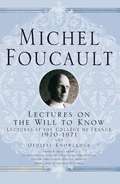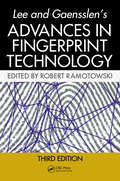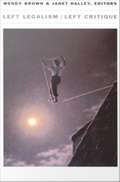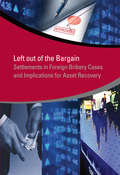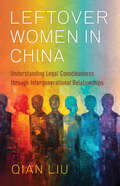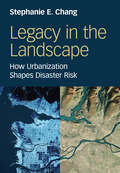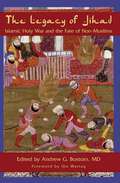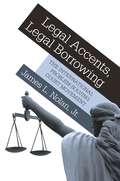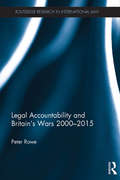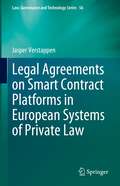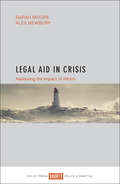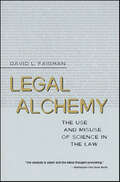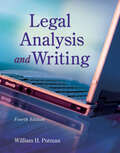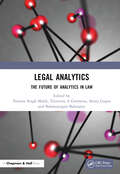- Table View
- List View
Leases & Rental Agreements: Keep Your House or Walk Away With Money in Your Pocket
by Janet Portman Marcia StewartCreate a solid, binding lease that complies with your state laws If you rent out residential real estate, you need to create documents that are legally valid where your rental property is located. Every state’s rules are different when it comes to what landlords must include in their leases, and stationery store forms don’t tell you what you need to know. Not only does this book contain instructions on how to tailor your rental documents to your state’s laws, it also gives you customizable copies of key rental forms you need, including: a fixed-term lease a month-to-month rental agreement a rental application tenant reference and credit check forms move-in and move-out letters, and a property inspection checklist. The 13th edition is completely updated to reflect the latest state landlord-tenant laws—find out what your state requires regarding security deposits, entry to rental property, disclosures, termination notices, and much more. This new edition also covers topics relevant to today’s landlords, such as how to handle online transactions, how to make sure e-signatures are valid, and how to comply with laws protecting your tenants’ private information.
Leases and Rental Agreements (Tenth Edition)
by Ralph Warner Janet Portman Marcia StewartLooking for a quick way to create the key documents necessary for owning or managing rental property, including a legally valid lease or rental agreement? Leases & Rental Agreements provides the practical and legal information necessary you need. With this bestselling guide, you'll learn how to: - prepare a rental agreement or lease - tailor your documents to meet your needs - make required disclosures to tenants - comply with your state's laws on security deposits, privacy rules, discrimination and more - check tenant references and credit - do a final inspection when a tenant moves out This edition provides updated 50-state information on security deposits, rent rules, access to rental property and more, plus an expanded chart on state disclosure laws.
Least Wanted
by Debbi MackStephanie Ann Sam McRae's busy, but orderly life as a Maryland lawyer takes a chaotic turn when two clients are accused of murder. A poor, black girl is accused of killing her mother. A young man suspected of embezzlement is accused of murdering his boss. The cases collide in a bizarre way around girl gangs and computer porn. A maniac killer stalks Sam, who must learn the truth or die trying.
Leben als Experiment: Selbstsorge und Lebenskunst bei Friedrich Nietzsche, Ludwig Wittgenstein und Susan Sontag (Schriften zur Kritischen Lebenskunst)
by Kristina JaspersFriedrich Nietzsche, Ludwig Wittgenstein und Susan Sontag beschäftigten sich intensiv mit Fragen der Selbstsorge und Lebenskunst – teils im direkten Bezug aufeinander. So sah Wittgenstein in Nietzsche ein Vorbild in Fragen der Stilistik und Introspektion; Sontag wollte Wittgenstein in der Konsequenz seiner Lebensentscheidungen folgen und Nietzsche in seinem Selbstbewusstsein sowie in seiner radikalen Selbstkritik. Diese Arbeit untersucht drei Experimentierfelder, auf denen Nietzsche, Wittgenstein und Sontag sich erprobt haben und macht diese für heute fruchtbar: Ortswechsel dienen der Veränderung des äußeren Umfelds, der Suche nach neuen Anregungen oder dem Rückzug in eine ihnen gemäße Umgebung. Die Beschäftigung mit Gesundheit und Krankheit betrifft ihre psychische wie physische Verfasstheit und schließt mentale Übungen ein. In der künstlerischen Praxis suchen alle drei neue Erfahrungen, ein anderes Selbsterleben sowie Ausdrucksmöglichkeiten jenseits der Sprache.
Lectures on Antitrust Economics
by Michael D. WhinstonAntitrust law regulates economic activity but differs in its operation from what is traditionally considered "regulation." Where regulation is often industry-specific and involves the direct setting of prices, product characteristics, or entry, antitrust law focuses more broadly on maintaining certain basic rules of competition. In these lectures Michael Whinston offers an accessible and lucid account of the economics behind antitrust law, looking at some of the most recent developments in antitrust economics and highlighting areas that require further research. He focuses on three areas: price fixing, in which competitors agree to restrict output or raise price; horizontal mergers, in which competitors agree to merge their operations; and exclusionary vertical contracts, in which a competitor seeks to exclude a rival. Antitrust commentators widely regard the prohibition on price fixing as the most settled and economically sound area of antitrust. Whinston's discussion seeks to unsettle this view, suggesting that some fundamental issues in this area are, in fact, not well understood. In his discussion of horizontal mergers, Whinston describes the substantial advances in recent theoretical and empirical work and suggests fruitful directions for further research. The complex area of exclusionary vertical contracts is perhaps the most controversial in antitrust. The influential "Chicago School" cast doubt on arguments that vertical contracts could be profitably used to exclude rivals. Recent theoretical work, to which Whinston has made important contributions, instead shows that such contracts can be profitable tools for exclusion. Whinston's discussion sheds light on the controversy in this area and the nature of those recent theoretical contributions. Sponsored by the Universidad Torcuato Di Tella
Lectures on Ethics
by Immanuel Kant Peter Heath J. B. SchneewindThis volume contains four versions of the lecture notes taken by Kant's students of his university courses in ethics given regularly over a period of some thirty years. The notes are very complete and expound not only Kant's views on ethics but many of his opinions on life and human nature. Much of this material has never before been translated into English. As with other volumes in the series, there are copious linguistic and explanatory notes and a glossary of key terms.
Lectures on the History of Moral and Political Philosophy
by Jonathan Wolff G. A. CohenPreviously unpublished writings from one of the most important political philosophers of recent timesG. A. Cohen was one of the leading political philosophers of recent times. He first came to wide attention in 1978 with the prize-winning book Karl Marx's Theory of History: A Defence. In subsequent decades his published writings largely turned away from the history of philosophy, focusing instead on equality, freedom, and justice. However, throughout his career he regularly lectured on a wide range of moral and political philosophers of the past. This volume collects these previously unpublished lectures.Starting with a chapter centered on Plato, but also discussing the pre-Socratics as well as Aristotle, the book moves to social contract theory as discussed by Hobbes, Locke, and Hume, and then continues with chapters on Kant, Hegel, and Nietzsche. The book also contains some previously published but uncollected papers on Marx, Hobbes, and Kant, among other figures. The collection concludes with a memoir of Cohen written by the volume editor, Jonathan Wolff, who was a student of Cohen's.A hallmark of the lectures is Cohen's engagement with the thinkers he discusses. Rather than simply trying to render their thought accessible to the modern reader, he tests whether their arguments and positions are clear, sound, and free from contradiction. Throughout, he homes in on central issues and provides fresh approaches to the philosophers he examines. Ultimately, these lectures teach us not only about some of the great thinkers in the history of moral and political philosophy, but also about one of the great thinkers of our time: Cohen himself.
Lectures on the History of Political Philosophy
by John RawlsThis last book by the late John Rawls, derived from written lectures and notes for his long-running course on modern political philosophy, offers readers an account of the liberal political tradition from a scholar viewed by many as the greatest contemporary exponent of the philosophy behind that tradition. Rawls’s goal in the lectures was, he wrote, “to identify the more central features of liberalism as expressing a political conception of justice when liberalism is viewed from within the tradition of democratic constitutionalism.” He does this by looking at several strands that make up the liberal and democratic constitutional traditions, and at the historical figures who best represent these strands—among them the contractarians Hobbes, Locke, and Rousseau; the utilitarians Hume, Sidgwick, and J. S. Mill; and Marx regarded as a critic of liberalism. Rawls’s lectures on Bishop Joseph Butler also are included in an appendix. Constantly revised and refined over three decades, Rawls’s lectures on these figures reflect his developing and changing views on the history of liberalism and democracy—as well as how he saw his own work in relation to those traditions. With its clear and careful analyses of the doctrine of the social contract, utilitarianism, and socialism—and of their most influential proponents—this volume has a critical place in the traditions it expounds. Marked by Rawls’s characteristic patience and curiosity, and scrupulously edited by his student and teaching assistant, Samuel Freeman, these lectures are a fitting final addition to his oeuvre, and to the history of political philosophy as well.
Lectures on the Philosophy of Right, 1819–1820
by G.W.F. HegelPublished in 1821, Outlines of the Philosophy of Right is considered the definitive articulation of the legal, moral, social, and political philosophy of G.W.F. Hegel. However, shortly before its publication, Hegel delivered a series of lectures on the subject matter of the work at the University of Berlin. These lectures are unlike any others Hegel gave on the philosophy of Right in that they do not supplement a published text but rather give a full and independent presentation of his mature political thought. Yet, they are also unlike Hegel’s formal treatise in that they form a smooth and flowing discourse, much like Hegel’s lectures on the philosophy of history, philosophy of art, philosophy of religion, and history of philosophy. Substantively, these lectures contain more extensive discussions of poverty and the proletariat than are found in Hegel’s published text – discussions that carry out the retreat from optimism about the present age intimated in the preface to Outlines but nowhere evident in the text itself. Translated with an introduction and notes by Alan Brudner, Hegel’s 1819/20 lectures on the philosophy of Right present his complete thoughts on law and the state in a manner that is more accessible and engaging than any other Hegelian text on these subjects.
Lectures on the Relation Between Law and Public Opinion in England During the Nineteenth Century (Social Science Classics)
by Albert Venn DiceyThe famed 1914 edition of this classic is one of the small handful of works that deserve to be read by Americans to understand the 1980s. Indeed, the final three chapters, describing the decline of will and consensus in late Victorian England, stand as a stark, unmistakable reminder that such national decline can happen again. Dicey was the most influential constitutional authority in late Victorian and Edwardian Britain. Modern politicians have often invoked the phrase "rule of law." So commonplace has it become that few recognize its source in the work of Dicey. Law and Public Opinion in England is written with simplicity, wit and a sense of purpose that marks it as a book apart. It did much more than fortell the decline of empire, it developed the forms in which such decline comes about. In many ways this book represents a pioneering statement on the libertarian tradition as a consequence of rather than rebellion against the legal norms of an advanced civilization. This is a central book for students of society and politics alike.
Lectures on the Will to Know: Lectures at the College De France 1970–1971 and Oedipal Knowledge
by Daniel DefertLectures on the Will to Know reminds us that Michel Foucault's work only ever had one object: truth. Here, he builds on his earlier work, Discipline and Punish, to explore the relationship between tragedy, conflict, and truth-telling. He also explores the different forms of truth-telling, and their relation to power and the law. The publication of Lectures on the Will to Know marks a milestone in Foucault's reception, and it will no longer be possible to read him in the same way as before.
Lee and Gaensslen's Advances in Fingerprint Technology
by Allan GawReflecting new discoveries in fingerprint science, Lee and Gaensslen‘s Advances in Fingerprint Technology, Third Edition has been completely updated with new material and nearly double the references contained in the previous edition. The book begins with a detailed review of current, widely used development techniques, as well as some older, histo
Left Legalism / Left Critique
by Wendy Brown Janet HalleyIn recent decades, left political projects in the United States have taken a strong legalistic turn. From affirmative action to protection against sexual harassment, from indigenous peoples' rights to gay marriage, the struggle to eliminate subordination or exclusion and to achieve substantive equality has been waged through courts and legislation. At the same time, critiques of legalism have generally come to be regarded by liberal and left reformers as politically irrelevant at best, politically disunifying and disorienting at worst. This conjunction of a turn toward left legalism with a turn away from critique has hardened an intellectually defensive, brittle, and unreflective left sensibility at a moment when precisely the opposite is needed. Certainly, the left can engage strategically with the law, but if it does not also track the effects of this engagement--effects that often exceed or even redound against its explicit aims--it will unwittingly foster political institutions and doctrines strikingly at odds with its own values. Brown and Halley have assembled essays from diverse contributors--law professors, philosophers, political theorists, and literary critics--united chiefly by their willingness to think critically from the left about left legal projects. The essays themselves vary by topic, by theoretical approach, and by conclusion. While some contributors attempt to rework particular left legal projects, others insist upon abandoning or replacing those projects. Still others leave open the question of what is to be done as they devote their critical attention to understanding what we are doing. Above all, Left Legalism/Left Critique is a rare contemporary argument and model for the intellectually exhilarating and politically enriching dimensions of left critique--dimensions that persist even, and perhaps especially, when critique is unsure of the intellectual and political possibilities it may produce. Contributors: Lauren Berlant, Wendy Brown, Judith Butler, Drucilla Cornell, Richard T. Ford, Katherine M. Franke, Janet Halley, Mark Kelman, David Kennedy, Duncan Kennedy, Gillian Lester, Michael Warner
Left Out of the Bargain
by Ji Won Park Jeanne M. Hauch Agustin Flah Dorothee Gottwald Francisca M.U. Fernando Jacinta Anyango Oduor Marianne Mathias Oliver StolpeOver the past decade, countries have increasingly used settlements-that is, any procedure short of a full trial-to conclude foreign bribery cases and have imposed billions in monetary sanctions. There exists a gap in knowledge, however, regarding settlement practices around the world and the disposition of these monetary sanctions-notably through the lens of recovery of stolen assets. Left out of the Bargain, a study by the Stolen Asset Recovery Initiative (StAR), provides an overview of settlement practices by civil and common law countries that have been active in the fight against foreign bribery. Using the United Nations Convention against Corruption (UNCAC) as its point of reference, the study addresses concerns voiced by the international community: What happens to the money associated with the settlements, and is it being returned to those most directly harmed by the corrupt practices? And what can be done to assist those countries harmed by foreign bribery? Left out of the Bargain has found that 395 settlement cases took place between 1999 and mid-2012, resulting in a total of US$6.9 billion in monetary sanctions imposed against companies and individuals. Of this amount, nearly US$6 billion came from settlements that took place in a country different from that of the allegedly bribed foreign public officials. But only about US$197 million, or 3 percent, has been returned or ordered returned to the countries whose officials were accused of accepting bribes. Left out of the Bargain urges countries whose officials were allegedly bribed to intensify their efforts to investigate and prosecute the providers and recipients of foreign bribes, hence improving these countries' prospects for recovery of assets lost through corruption. The study also calls for more proactive international cooperation and coordination to ensure that all affected countries are afforded the opportunity to seek redress for harms suffered and for the recovery of assets-thus fulfilling the principles set out in UNCAC.
Leftover Women in China: Understanding Legal Consciousness through Intergenerational Relationships
by Qian LiuA free ebook version of this title is available through Luminos, University of California Press's Open Access publishing program. Visit www.luminosoa.org to learn more.Leftover Women in China offers an intimate empirical and theoretical analysis of the lived experience and legal consciousness of China's "leftover women," women who remain unmarried in their late twenties and beyond. Drawing on in-depth interviews and focus groups, Qian Liu examines how leftover women—including women who prefer to remain single, those who are waiting for the right husband, and queer women—deal with parental and social pressures, as well as the denial of their right to have children outside of heterosexual marriage. Sensitively exploring the distinctive patterns of parent-child interactions in Chinese families, Liu invites readers to understand leftover women's observance, evasion, and manipulation of the law in the context of intergenerational relationships and obligations.
Legacy in the Landscape: How Urbanization Shapes Disaster Risk
by Stephanie E. ChangWith its focus on the city rather than the disaster event, this book situates natural disasters in the context of urban growth and change. It offers an original, interdisciplinary perspective by connecting the technical and socioeconomic dimensions of disaster risk and highlighting the commonalities of hazards such as river flooding, coastal flooding, and earthquakes. The book begins by proposing a novel Urban Risk Dynamics framework that emphasizes the roles of economy, landscape, and technology in influencing hazard, exposure, and vulnerability. This framework is then used to support the examination of six contrasting cities from around the world, offering generalized insights that apply to a wide range of urban risk contexts. The book will be of significant interest to students and researchers working in urban planning, civil engineering, Earth sciences, and environmental science, and to policy makers and practitioners concerned with reducing future disaster risk in cities.
Legacy of Jihad: Islamic Holy War and the Fate of Non-Muslims
by Andrew G. BostomThis book reveals how, for well over a millennium and across three continents - Asia, Africa, and Europe - non-Muslims who were vanquished by jihad wars became forced tributaries (called dhimmi in Arabic) in lieu of being slain. Under the dhimmi religious caste system, non-Muslims were subjected to legal and financial oppression, as well as social isolation. Extensive primary and secondary source materials, many translated here for the first time into English, are presented, making clear that jihad conquests were brutal, imperialist advances, which spurred waves of Muslims to expropriate a vast expanse of lands and subdue millions of indigenous peoples. Finally, the book examines how jihad war, as a permanent and uniquely Islamic institution, ultimately regulates the relations of Muslims with non-Muslims to this day. Scholars, educators, and interested lay readers will find this collection an invaluable resource.
Legal Accents, Legal Borrowing: The International Problem-Solving Court Movement
by James L. NolanA wide variety of problem-solving courts have been developed in the United States over the past two decades and are now being adopted in countries around the world. These innovative courts--including drug courts, community courts, domestic violence courts, and mental health courts--do not simply adjudicate offenders. Rather, they attempt to solve the problems underlying such criminal behaviors as petty theft, prostitution, and drug offenses. Legal Accents, Legal Borrowing is a study of the international problem-solving court movement and the first comparative analysis of the development of these courts in the United States and the other countries where the movement is most advanced: England, Scotland, Ireland, Canada, and Australia. Looking at the various ways in which problem-solving courts have been taken up in these countries, James Nolan finds that while importers often see themselves as adapting the American courts to suit local conditions, they may actually be taking in more aspects of American law and culture than they realize or desire. In the countries that adopt them, problem-solving courts may in fact fundamentally challenge traditional ideas about justice. Based on ethnographic research in all six countries, the book examines these cases of legal borrowing for what they reveal about legal and cultural differences, the inextricable tie between law and culture, the processes of globalization, the unique but contested global role of the United States, and the changing face of law and justice around the world.
Legal Accountability and Britain's Wars 2000-2015 (Routledge Research in International Law)
by Peter RoweThis book discusses the manner in which Britain’s wars, which took place between 2000 and 2015, have interacted with the relevant principles of international law and English law for the purpose, primarily, of considering legal accountability. During a debate in the House of Lords in 2005 a former Chief of the Defence Staff commented that ‘the Armed Forces are under legal siege.’ The book will discuss the major legal issues which have arisen, ranging from the various votes in Parliament to go to war, the constitutional relationship between ministers and senior commanders, the right under international law to use force, the influence of human rights law, the role of the courts in England (including the coroners’ courts), to the legal regime applying to the conduct of UK military operations. It will assess critically whether the armed forces will now have to accept that operations conducted outside the UK are subject to greater legal scrutiny than previously and whether, if this is the case, it is likely to hinder their future military activities. This book will be of great interest to scholars of international law, the law of armed conflict, military studies and international relations, as well as to those with a professional or other interest in the subject matter.
Legal Agreements on Smart Contract Platforms in European Systems of Private Law (Law, Governance and Technology Series #56)
by Jasper VerstappenBlockchains and smart contracts are emerging technologies that pose unique challenges for legal systems. This book outlines the extent to which these new and innovative technologies could have potentially disruptive effects on contract law in Europe. It does so through a comparative, three-part analysis of the recognisability and effects of smart contracts in European legal systems. First of all, in light of the technologies’ transboundary nature, the book employs a comparative approach, considering French law, German law, English law, and Dutch law to analyse the impact on the different systems of contract law. While doing so, it also addresses the formation, interpretation, and vitiation of contracts. Secondly, it analyses the impact of these technologies on European laws regarding unfair terms in consumer contracts and argues that the existing rules should be applied to smart legal agreements in business-to-consumer relations. Lastly, it analyses the current European rules of private international law on the basis of which jurisdiction and applicable law are developed. In this respect, the book concludes that the vast majority of these European rules are “smart contract-proof”.
Legal Aid in Crisis: Assessing the Impact of Reform
by Sarah Moore Alex NewburyOriginally introduced as a form of social welfare with near-universal eligibility, legal aid in the UK is now framed as a benefit external to the legal system and understood in primarily economic terms. This book is the first to evaluate the recent reforms of UK legal aid from a social policy perspective and assess their impact on family law courts and advocacy. Written by experts in the field, it focuses on the rise in people representing their own legal case and argues that the reforms effectively ‘delawyerise’ disputes, producing a more inquisitorial justice system and impacting the litigants, court system, staff and process. Arguing for a more holistic concept of the reforms, the book will be of relevance to students, academics, policy-makers, judges, campaigners and social workers, not just in England and Wales, but in other jurisdictions instituting cuts to their legal aid budgets, such as Australia, Scotland, France, and the Netherlands.
Legal Alchemy: The Use and Misuse of Science in the Law
by David L. FaigmanIs scientific information misused by this country's court system and lawmakers? Today more than ever before, lawyers, politicians, and government administrators are forced to wrestle with scientific research and to employ scientific thinking. The results are often less than enlightened.In Legal Alchemy, David Faigman explores the ways the American legal system incorporates scientific knowledge into its decision making. Praised by both legal and scientific communities when it first appeared in hardcover, Legal Alchemy shows how science has been used and misused in a variety of settings, including• The Courtroom—from the O. J. Simpson trial to the Dow Corning silicone breast implant lawsuit to landmark cases such as Roe v. Wade. • The Legislature—where Congress uses scientific information to help enact legislation about clean air, cloning, and government science projects like the space station and the superconducting super collider. • Government Agencies—who use science to determine policy on a variety of topics, from regulating sport utility vehicles to reintroducing gray wolves to Yellowstone National Park. As Faigman describes these and other important cases, he provides disturbing evidence that many judges, juries, and members of Congress simply don't understand the science behind their decisions. Finally, he offers suggestions on how the science and legal professions can overcome their miscommunication and work together more effectively.
Legal Analysis and Writing
by William H. PutmanLEGAL ANALYSIS AND WRITING, 4TH EDITION helps readers analyze statutes and cases and draft supporting legal memoranda. In addition to the fundamentals of good writing, legal or otherwise, the book illustrates how paralegals analyze and brief cases, identify key facts and legal issues, and apply case law and counteranalysis to legal matters, and more. Going beyond mere explanations, the book shows readers how to apply concepts to hypothetical situations, draft legal memoranda and correspondence, and scrutinize legal citations and Web research, to develop a thorough understanding of the analytical and writing responsibilities paralegals undertake. Legal Analysis and Writing, 4th Edition is a robust resource for any paralegal writing course and includes a host of available supplemental tools designed to enhance learning while simplifying instructor preparation.
Legal Analysis: The Fundamental Skill
by David S. Romantz Kathleen Elliott VinsonThe third edition of Legal Analysis: The Fundamental Skill continues to teach students the critical skills of legal reasoning. This popular book introduced the CREAC paradigm to law students. The third edition builds on the basics of the CREAC paradigm and explains how to use CREAC in a variety of additional ways. The book is a practical and clear guide that explains the many ways lawyers analyze the law. The authors demystify legal analysis through step-by-step explanations of the different levels of critical thinking to thoroughly explain and apply the law to a client's case. New examples and exercises are also included.
Legal Analytics: The Future of Analytics in Law
by Namita Singh Malik, Elizaveta A Gromova, Smita Gupta and Balamurugan BalusamyLegal Analytics: The Future of Analytics in Law navigates the crisscrossing of intelligent technology and legal field in building up new landscape of transformation. Legal automation navigation is multidimensional wherein it intends to construct streamline communication, approval and management of legal task. Evolving environment of technology has emphasized need for better automations in legal field from time to time. Although legal scholars took long to embrace Information revolution of legal field. •Describes the historical development of law and automation •Analyses the challenges and opportunities in law and automation •Studies the current research and development in the convergence of Law, Artificial Intelligence and Legal Analytics •Explores the recent emerging trends and technologies that are used by various legal System globally for Crime Prediction & Prevention •Examines the applicability of legal analytics in forensic investigation •Investigates the impact of legal analytics tools and techniques in judicial decision making •Analyses deep learning techniques and its scope in accelerating legal analytics in developed and developing countries • Provides the in-depth analysis of implementation, challenges and issues in the society related to legal analytics The book is primarily aimed at graduates, postgraduates in law & technology, computer science and information technology. Legal practitioners and academicians will also find this book helpful.


